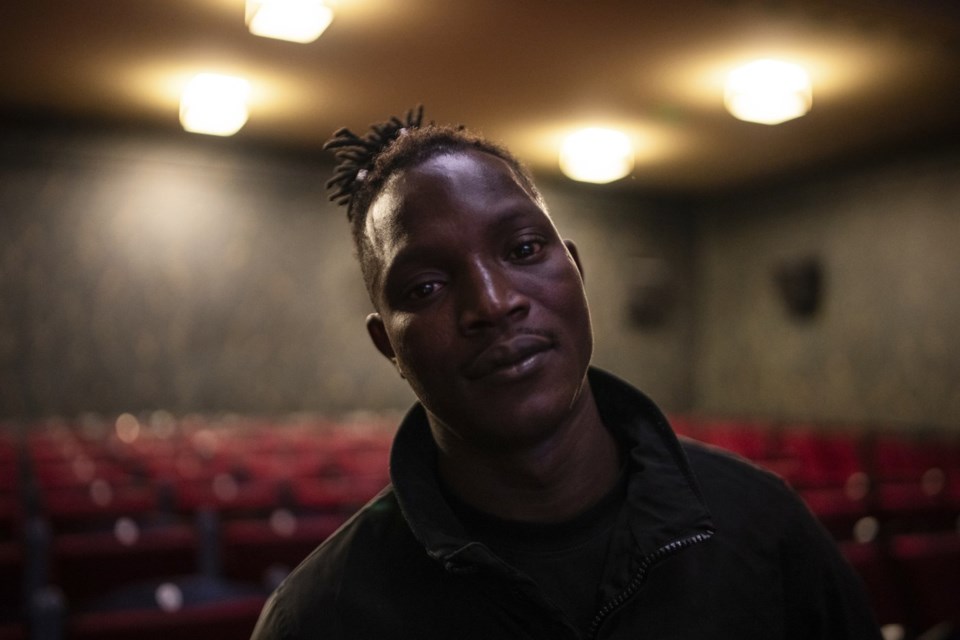PARIS (AP) ŌĆö A few months ago, Abou Sangare was an anonymous, 23-year-old Guinean immigrant lacking permanent legal status in northern France and, like thousands of others, fighting deportation.
Now a lead actor in ŌĆ£SouleymaneŌĆÖs Story,ŌĆØ an award-winning feature film that hit French theaters this week, his face is on every street corner and in subway stations, bus stops and newspapers.
The film and SangareŌĆÖs sudden success are casting light on irregular migration in France just as its new government is taking a harder line on the issue. It is vowing to make it harder for immigrants lacking permanent legal status to stay and easier for France to expel them.
Sangare plays a young asylum-seeker who works as a Paris delivery man, weaving his bicycle through traffic in the City of Light. In a case of life imitating art, Sangare's future also hangs in the balance. Like the character he portrays, Sangare is hoping to persuade French officials to grant him residency and abandon their efforts to force him to leave.
ŌĆ£When I see Souleymane sitting in the French Office for the Protection of Refugees and Stateless Persons, I put myself in his place, because I know what itŌĆÖs like to wait for your (identification) papers here in France, to be in this situation ŌĆö the stress, the anxiety,ŌĆØ Sangare told The Associated Press in an interview.
ŌĆ£Like me, Souleymane finds himself in an environment that he doesnŌĆÖt know.ŌĆØ
Sangare says he left Guinea at age 15 in 2016 to help his sick mother. He first went to Algeria, then Libya, where he was jailed and treated ŌĆ£as a slaveŌĆØ after a failed crossing attempt. Italy was next, and he eventually set foot in France in May 2017.
His request to be recognized as a minor was turned down, but he was able to study at high school and trained as a car mechanic ŌĆö a skill in demand in France. Recently, he was offered full-time employment at a workshop in Amiens, a northern French town that has been his home for seven years and which, incidentally, was French President Emmanuel Macron's hometown, too.
But Sangare cannot accept the job because of his illegal status. He's unsuccessfully applied three times for papers and lives with a deportation order over his head.
Critics say deportation orders have been increasingly used by successive governments.
ŌĆ£We are the country in Europe that produces most expulsion procedures, far ahead of other countries,ŌĆØ said Serge Slama, a professor in public law at the University of Grenoble.
But their use ŌĆö more than 130,000 deportations were ordered in 2023 ŌĆö is "highly inefficient,ŌĆØ he added, because many of the orders aren't or cannot for legal reasons be carried out.
Interior Minister Bruno Retailleau says about 10% of people targeted for deportation end up leaving.
Retailleau, appointed in France's new government of conservatives and centrists last month, is making immigration control a priority.
He wants more immigrants lacking permanent legal status to be held in detention centers and for longer periods, and is leaning on regional administrators to get tough.
He also says he wants to reduce the number of foreigners entering France by making it ŌĆ£less attractive,ŌĆØ including squeezing social benefits for them.
Mathilde Buffi├©re, who works with immigrants in administrative detention centers with the nonprofit Groupe SOS Solidarit├®s, says officials are spending ŌĆ£less and less time" reviewing immigrants' residency applications before holding them in detention centers.
In SangareŌĆÖs case, his life took a turn last year when he met filmmaker Boris Lojkine. Several auditions led to him getting the film's lead role.
Sangare won Best Actor at the Cannes Film FestivalŌĆÖs ŌĆ£Un Certain RegardŌĆØ competition this year.
But a more meaningful prize might be on the horizon: After Cannes, government officials emailed Sangare, inviting him to renew his residency application.
Responding to AP questions, French authorities said the deportation order against Sangare ŌĆ£remains legally in force" but added that officials reexamined his case because of steps he's taken to integrate.
ŌĆ£I think the film did that,ŌĆØ Sangare told AP.
ŌĆ£You need a residency permit to be able to turn your life around here. My life will change the day I have my papers,ŌĆØ he said.
Diane Jeantet, The Associated Press



